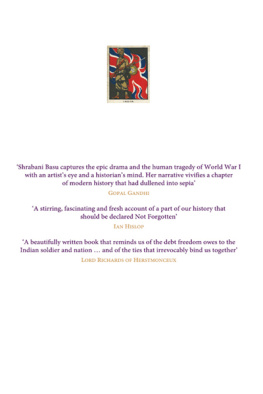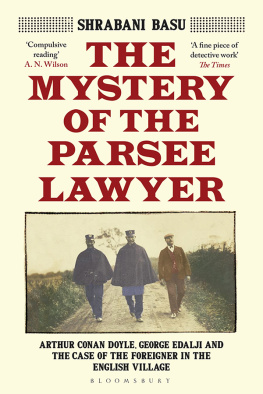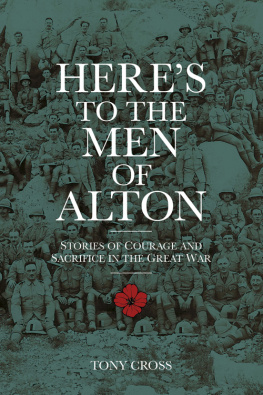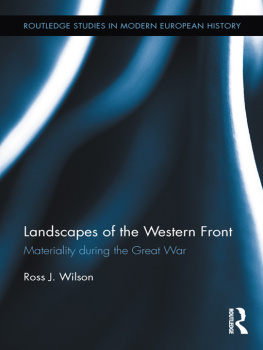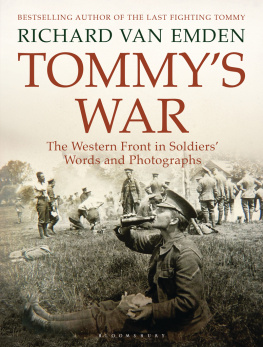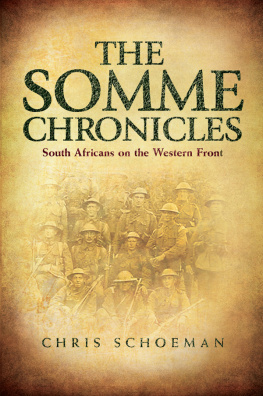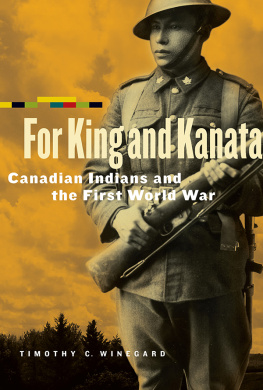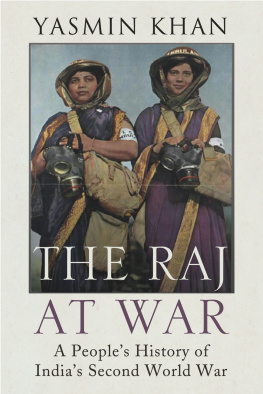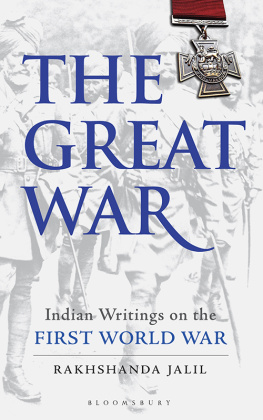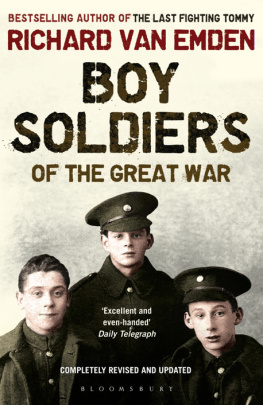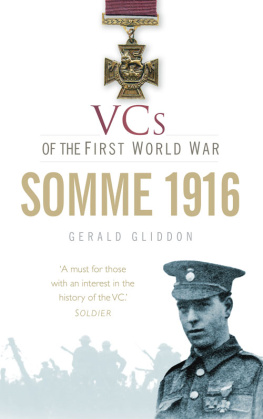FOR KING AND ANOTHER COUNTRY
FOR KING AND
ANOTHER COUNTRY
Indian Soldiers on the Western Front
191418
Shrabani Basu
B L O O M S B U R Y
NEW DELHI LONDON OXFORD NEW YORK SYDNEY
First published in India 2015
Copyright Shrabani Basu 2015
The moral right of the author has been asserted.
No part of this book may be used or reproduced in any manner whatsoever
without written permission from the publisher except in the case of brief
quotations embedded in critical articles or reviews.
Every reasonable effort has been made to trace copyright holders of
material reproduced in this book, but if any have been inadvertently
overlooked the publisher would be glad to hear from them.
Bloomsbury is a trademark of Bloomsbury Publishing Plc.
Bloomsbury Publishing, London, New Delhi, New York and Sydney
A CIP catalogue record for this book is available from the British Library.
ISBN: 978 93 85436 49 9
Bloomsbury Publishing India
2nd Floor, Building No. 4
DDA Complex, Pocket C - 6 & 7
Vasant Kunj, New Delhi 110070
www.bloomsbury.com
To my parents
Lo! I have flung to the East and the West
Priceless treasures torn from my breast,
And yielded the sons of my stricken womb
To the drum-beats of the duty, the sabers of doom.
Gathered like pearls in their alien graves
Silent they sleep by the Persian waves,
Scattered like shells on Egyptian sands,
They lie with pale brows and brave, broken hands,
they are strewn like blossoms mown down by chance
On the blood-brown meadows of Flanders and France.
Sarojini Naidu
The Gift of India, 1915
Authors Note
The term Indian soldiers in the context of this book refers to soldiers from pre-partition India and comprises soldiers from India, Pakistan and Nepal.
In order to retain the authenticity of the period, I have used the old British names and spellings of the various Indian cities e.g. Calcutta for Kolkata, Madras for Chennai, Jullunder for Jalandhar etc.
Contents
Frontline, Western Front, 1914

Dramatis Personae
THE INDIANS
The Soldiers:
Khudadad Khan 129th Baluchis
Darwan Singh Negi 39th Garhwalis
Gabar Singh Negi 39th Garhwalis
Mir Dast 57th Wildes
Mir Mast 58th Vaughans Rifles
Manta Singh 15th Sikhs
The Airmen:
Hardit Singh Malik Royal Flying Corps
Indra Lal Roy Royal Flying Corps
The Maharajas:
Sir Ganga Singh Maharaja of Bikaner
Sir Pratap Singh Regent of Jodhpur
Sir Bhupinder Singh Maharaja of Patiala
The Official:
Lord Sinha Representative at the Imperial War Cabinet
The Cleaner
Sukha
THE BRITISH
The Generals:
Lord Roberts Former Commander-in-Chief of Indian Army
General John French Commander-in-Chief of the British Expeditionary Force 19141915
General James Willcocks Commander-in-Chief of the Indian Corps in France 19141916
General Douglas Haig Commander-in-Chief of British Expeditionary Force 19151918
The Viceroys:
Lord Hardinge 19111916
Lord Chelmsford 19161921
The War Office:
Lord Kitchener Secretary of State for War 19141916
Sir Walter Lawrence Commissioner for sick and wounded Indian soldiers in France and England 191416
Indian Soldiers Fund:
Lord Curzon Former Viceroy of India, Executive Committee Member, Indian Soldiers Fund
The Cabinet:
Lord Crewe Secretary of State for India 19111915
Austen Chamberlain Secretary of State for India 19151917
Lord Montagu Secretary of State for India 19171922
Introduction
On a quiet country road surrounded by miles of flat farmland in Northern France stands a circular monument with INDIA 19141918 inscribed on it. Flanked by two large willow trees, the memorial has a pillar with a tiger on either side. On it are the words God is One, He is the Victory written in English, Urdu, Hindi and Gurmukhi. In the centre of the garden is an inscription: Their name liveth for evermore.
Bathed in the spring sunshine, the memorial is a peaceful haven in the middle of the fields. Occasionally a car passes by, its owners largely unaware of the story that lies within the latticed walls. A caf opposite advertises croissants and coffees, but it is shut. Few people visit the place, miles away from any tourist trail. It is hard to imagine that a hundred years ago, this tranquil spot near the village of Neuve Chapelle, was the scene of a pitched battle in the First World War, the sound of artillery fire drowning the songbirds and the cries of the injured shattering the silence of the countryside.
It was here between 10 and 13 March 1915 that Indian soldiers fought as a single unit and broke through the German defence for the first time. The casualties were heavy but they succeeded in capturing vital sections of the German line. Most of the bodies were never found. Carved on the circular wall of the Indian Memorial at Neuve Chapelle are the names of over 4,742 Indian soldiers and non-combatants who died on the Western Front in the First World War and have no known graves. Thousands of miles from their homeland, the names on the sandstone wall are all that is left to remember them by.
The memorial designed by Herbert Baker was inaugurated in October 1927, nine years after the end of the war. The opening ceremony was attended among others by the Maharaja of Kapurthala, Marshall Foch, the Earl of Birkenhead, Rudyard Kipling and several veterans. Over the years, the commemoration events slowed down. There was no one at the Memorial the day I visited. It felt almost surreal standing in a field in France surrounded by the names of Indians. A single poppy wreath lay near the plinth, laid by a British foreign office minister a month ago. It said: Our shared future is built on our shared past. We will remember them.

The first Indian casualties of the First World War were not on the Western Front. Nor did they happen on the harsh deserts of Mesopotamia or Africa. They happened on Indian soil, before the troops had even reached the frontline.
It was an ordinary September morning, the third day of the Hindu festival of Navratri. The residents of Madras were going about their business. Moses and Company, the tailors on Mount Road, were advertising their woollen suits and woollen underwear for Europe-bound students. Madras Corporation was debating the closure of a road. The High Court was in session. It was less than two months into the war, but the guns seemed far away. All this would change in a few hours.
On the night of 22 September 1914, the German cruise ship SMS Emden silently entered the dark waters of the Bay of Bengal. The 3,600 tonne Emden was on a mission to sink commercial ships. There were no Allied ships guarding the port of Madras. It was almost as if the city was unaware of the war. The Emden boldly took its chance. Armed with 22 guns, the ship dropped anchor just 2,500 metres off the harbour, the starboard side facing the city.
The commandant of the ship, Karl Friedrich Max von Mller, asked his men to bathe, wear laundered uniforms and prepare for an attack. These precautions would reduce the risk of infection if there was any retaliation. The sea was calm and there was no activity on the coast. The lighthouse in the grounds of the Madras High Court was flashing as usual. The powerful beam clearly lit up three oil tankers positioned nearby. They were painted white with red stripes. It made the job easy for the gunners. The commandant had his target. At about twenty minutes past nine, he ordered his men to fire.

